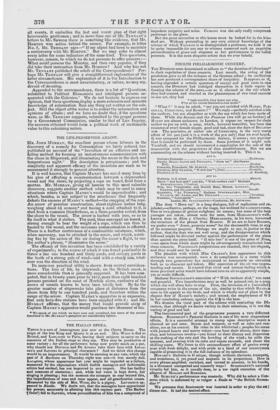FOURTH PHILHARMONIC CONCERT.
THE Directors seem determined to adhere to " the doctrine of vibrations" in their regulation of these concerts. Last month, the swing of the pendulum gave us all the richness of the German school ; its oscillation has now produced a correspondent share of insipidity. It appears as if, having expended a certain quantum of energy and good taste in one concert, the Directors had indulged themselves in a little repose in framing the scheme of the next,--or as if, alarmed at the stir which they had created, and startled at the phenomenon of two vocal encores in one act, they had
" back recoil'd, they knew not why, E'en at the sound themselves had made."
"What ! " it may be asked, " are you not satisfied with Ilsynn, RAE.
CIIERUBINI, and ROSSINI ?" We reply—perfectly satisfied with the authors, but not altogether so with the use which has been made of them. While the Seasons and the Passione (we will go no farther) of HAYDN are almost unknown in London, it argues no respect for their author to put up with a song, which, however beautiful, has been the resource of every female singer, good and bad, since the days of Bir.srrias. rms. The quartetto, or rather ode of CHERUBINI' is the very worst effort of his pen (and it is a work of the pen only) that we ever heard. It was composed for the Philharmonic Society, it seems ; non sequitur that it should be performed by them. Some portions of it might suit Vauxhall, and we should recommend a negotiation for the sale of the manuscript with the proprietors of that establishment. But we are commenting on the scheme without having inserted it. This it is.
ACT I.
Sinfonia Pastorale Beethoven. Duetto, Messrs. SAP/0 and PHILLIPS, " Dove val " (Guillaume
Rossini.
ConTeeeiril.o, Pianoforte, Mr. Sumo Lz Moscheles. Cavatina, Miss CRAME a, " mio ben " (Mina) .Paesiello. Overture, iu I) 4. Romberg.
ACT II.
Sinfonia, in G minor Mozart.
Recit. "And God said," and Air, " With verdure clad" Madame
STOCKHAUSEN, (Creation)
Haydn.
Trio, two Violoncellos and Double Bass, Messrs. LINDLEY CROUCH, and DRAGONETTI Quartetto, " La Primavera," Madame STOCKHAUSEN., Miss CnAAtEn, Mr. SAPIO, and Mr. P/IILLIPS Cherubini.
Overture, " Semiramide"
Rossini.
Leader, Mr. SPAGNOLETTI—Conductor, Mr. ATTIV 00D.
The duet "Dove vai" is a long dialogue, full of replication and re. joinder,—effective, perhaps, on the stage, but unfitted for a concert-room. One or two gleams of genius enlighten its course; but some of the best passages are taken, almost note for note, from MERCADANTE'S well- known duet in Elise e Claudio; MEncsnarrra, in his turn, borrowed the structure of the phrase from Rossm. If we are to have Rossna, we prefer even " Amor, possente some" for the thousandth time, to any of its numerous progeny. Perhaps we ought to say, in justice to the author, that the duet was not well sung, and the disapprobation which followed might be directed rather against the performance of the piece than against the piece itself. "Ii info ben" is one of the gems of Nina, —an opera from which more might be advantageously transplanted into these concerts. PAESIELLO'S compositions are classical, they are elegant, and they would now be novel. The plaudits with which Miss CRAMER'S first appearance in this orchestra was accompanied, were a fit compliment to a name which through two generations has maintained so honourable an elevation both as to character and talent. Her execution of the air was unpre. tending and correct. It wanted that vivid and intense feeling which a more practised artist would have infused into an air so apparently simple, yet so really difficult. Madame STOCKHAUSEN'S execution of " With verdure clad," was neat and graceful. Two imperfections may as well be pointed out, in a song which she will often have to sing. First, the intrusion of a (tniscalled) ornament twice in the course of the air, similar to that which BRAIIAN uses in his appeals to the Gods, and which is wholly out of place in the elegant flow of HAYDN'S melody ; and second, the employment of Gr in her concluding cadence, against the G4 in the bass.
We dismiss the vocal part of the scheme with reminding the Did rectors, that although we desire variety in their selections, it is not the variety of good and bad.
The instrumental part of the programme presents a very different feature. BEETHOVEN'S Pastoral Sinfonia is one of his most stupendous efforts. It is a successful attempt to stamp upon descriptive music a classical air and tone. Storm and tempest, as well as calm and sun. shine, are at his control. He rides in the whirlwind ; peoples his scene with jocund hearts and merry voices—you hear their shouts, their dan- cing, and boisterous revelry—you listen to their dismay and ,dispersion at the rushing of the rain and the howling of the wind ; he stills the tempest, and evening with its calm and repose succeeds, and closes the shifting scene. We listen to this extraordinary effort of genius every year with fresh delight, and with pride to a band of our countrymen. capable of presenting it in the full radiance of its splendour. MOZART'S Sinfonia in G minor, though without clarinets, trumpets, and trombones, is yet grand and majestic in its proportions. How is every phrase amplified, enriched, and turned to account, in his hands, in a thousand unexpected and masterly ways SPAGNOLETTI'S national vivacity led him, as it usually does, to a too rapid execution of the allegros of MOZART and ROMBERG. Mr. SCHUTZ'S performance was masterly. Why did he select a Con- certo which is deformed by so vulgar a finale as "the British Grena. dier ?"
We presume that Semiratnide was inserted in order to play the,atti dience out. it had the desired effect.


























 Previous page
Previous page